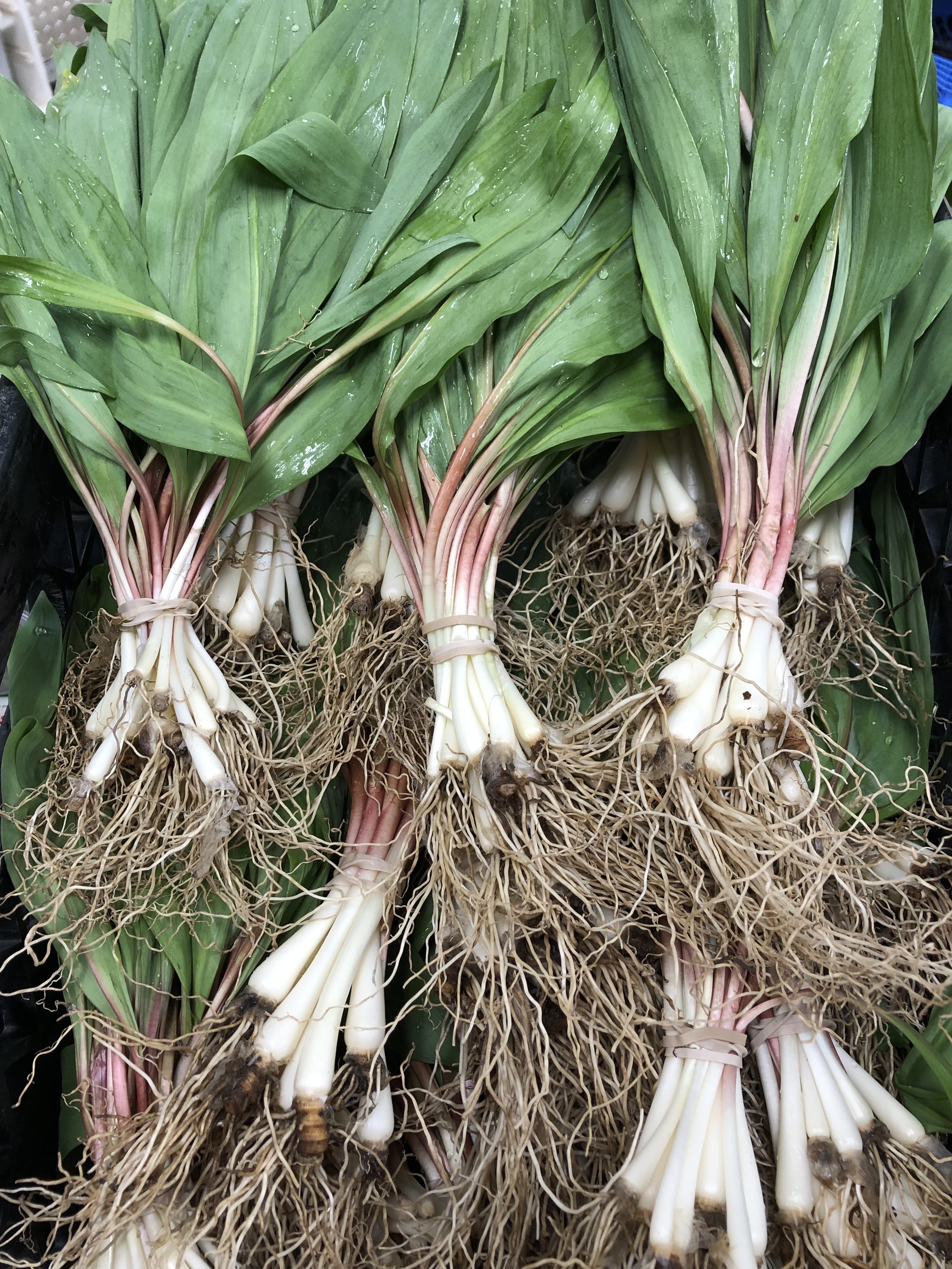Ramps, Organic Certifications, and more with Monroe Family Organics
At Argus Farm Stop, there are a few items that come in the store that signal a real beginning to the new growing season. We begin to see green garlic, green onions, and radishes as the sun comes out. But as the days turn from just above freezing, to so sunny your soul begs to stay outside, we see the arrival of asparagus, foraged morels, and ramps, signifying a moment of the season. Ramps are a special item in our store due to their cultivation, or lack thereof. Farmers can’t grow ramps at scale for the most part, so when ramps are harvested, it’s more of a foraging activity than a farming one. Our good friends at Monroe Family Organics in Alma, Michigan supply us with the vast majority of our ramps. We chatted with them to learn more about how they harvest Ramps, how they sell local produce to consumers, and different certification options for farms.
We’re always excited to have produce that is native to our region, such as strawberries, and ramps. Ramps are native to the forests of eastern North America. “They’re an onion type plant. They look like a lilly and grow in the woods.” Fred Monroe of Monroe Family Organics tells us. Along with other alliums like green onions and garlic, ramps grow from a bulb in the ground, growing two leaves out in the spring. This time of late April into May is when the ramps are visible and able to be harvested by foragers. (Jessee and Ram, 2024)
Ramps aren’t usually cultivated like almost all of our produce because they take a very long time to grow to maturity. From seed, ramps can take 7-10 years to fully develop into a harvestable ramp. Because of this extended period of time, foragers need to be sustainable and consider the environment when they forage. Taking too many bulbs from a ramp patch can cause the patch to diminish in size. The dangers to this local treasure is evident by the state of a particular variety of ramp, Allium tricoccum var. Burdickii, which environmentalists fear could go extinct.
Foraging sustainably for ramps involves never taking more than 10% of the bulbs of a ramp patch, leaving ample bulbs to continue to propagate. The Monroe Family follows this rule and then some in their harvest.
“We harvest by hand with garden forks, walking throughout a 40+ acre wood. We harvest about 1-2% of the ramps every year, way below the recommended sustainable harvest maximum of 10% which is probably conservative already. We do no-clear cutting, leaving a few of every clump we harvest to make sure they are still spread all over the woods.”
With access to ramp patches spreading across 40+ acres, the Monroes have been able to satisfy all the demand Argus Farm Stop customers have had the past couple years during ramp season. With their unique garlicky-onion taste, ramps are a specialty for chefs, but not everyone will be ready for their flavor. Some great ways to cook ramps involve sautéing the bulbs and leaves, pickling the bulbs, and even our recommended recipe of a Ramp Pesto! See our recipe at the bottom of this post to learn to make this great dish.
The arrival of Monroe Family Organics at Argus Farm Stop each year is a welcome sight, and a signal of local agriculture’s awakening from the winter. Based two hours north of Ann Arbor in Alma, Michigan, their products aren’t available in our stores for a couple short winter months, while it’s too cold for the Monroes to harvest enough produce to warrant the journey down to deliver. They have been farming for 14 years now and selling through Argus Farm Stop since 2018.
“Michele and I both quit our jobs and moved with our newborn Jane back to Alma, my hometown, to start the farm in 2011. It was just an open pasture with no infrastructure and we built it into the farm it is today.” Now, the Monroe Family Farm has built out a 300 person CSA, and increased the family size with three kids. Fred and Michele run the farm with two full-time and two part-time employees. They sell through Argus Farm Stop, other grocery/markets, and farm boxes such as Argus Farm Stop’s Weekly Produce Box. They grow a wide variety of vegetables, herbs, edible flowers, and even a microgreen mix.
Shoppers at Argus Farm Stop will recognize Monroe Family Organics for their cherry tomatoes, salad mix, potatoes, and carrots in addition to their ramps. Having these products to fill out our store is exciting not only because of how delicious they are, but Monroe Family Organics is one of our producers that is certified organic. We try to offer an organic option for as much of our produce as we can to our customers and while many producers use organic practices, not all of them have the certification.
The organic certification is a federal level certification from the USDA. The process for getting certified involves applications, fees, and on-site inspections, with annual reviews. The certification shows consumers that your products have been produced without GMOs, ionizing radiation, and more. There are strict rules to obtain the certification, banning the use of certain materials for growing food. Growing organically has been proven to improve the soil ecology on farms and improve water quality.
“Organic certification keeps us to a verified standard of growing practices which is easier to understand than just saying we are ‘natural’, which could mean almost anything.” Fred pointed out to us. “It does take some time, paperwork and expense.”
Many farms don’t have the organic certification from the USDA, not because they aren’t growing organically, but because they don’t find the financial investment in the certification to be worth the cost. Some small farms can’t afford to invest the possible thousands of dollars into the certification. They know their own growing practices and are very passionate about growing in ways that are good for the planet and people. A lot of producers at Argus Farm Stop would fit this description. Some have even had the certification before, but grew a loyal customer base that trusted them. So they forewent keeping the expense of the certification at a certain point, while keeping, and in some cases, expanding those organic practices on the farm.
Some don’t think the organic certification goes far enough, allowing certain growing practices to be labelled as organic that they wouldn’t consider good growing practices. This has led to the rise of alternative forms of certification such as the Real Organic Project, Certified Naturally Grown, and Good Agricultural Practices certifications. Multiple of our producers such as Green Things Farm Collective and The Farm On Jennings have sought out these alternative certifications that may have even more strict specifications than the USDA, and/or may have more farm friendly pricing structures. Monroe Family Organics were previously Good Agricultural Practices certified in addition to the USDA certification, but have not renewed that certification.
“We didn’t see the need for an extra expense and time. We did learn some valuable things to keep in practice even after we dropped the GAP certification.”
With different certifications on the rise, each with their own sets of rules and reapplications, farms and consumers can have a hard time keeping track of what each label may mean for their food. For now, the organic certification straight from the USDA still holds the standard in consumer’s minds for what “organic” means. With that standardization of the inspections and processes, Monroe Family Organics can count on their certification meaning something to their customers. Since 2018, we’ve been overjoyed to have their products available at our markets. You can buy fantastic and flavorful spinach, spring mix, ramps, green onions, green garlic, and more from Monroe Family Organics at Argus Farm Stop’s Liberty and Packard Market locations.
Exposing the whole family to the wonders of local food is something we at Argus Farm Stop cultivate everyday. Our resident Farm Stop Dietitian Mary Balog uses Monroe Family ramps each season with the group of Bach Elementary kindergarteners who come to the store each spring. Mary’s special Wild Ramp Pesto recipe is below.
Recipe:
Bach elementary kindergarten classes have been visiting Argus Farm Stop each spring for the last few years. They usually come during the brief season for wild ramps, so we get to make Wild Ramp Pesto when they visit. It's a great way for them to practice using a recipe, measuring ingredients, and tasting new foods. They also get to learn about Argus Farm Stop and have fun.
Wild Ramp Pesto is a fun and easy recipe that kids can help make! This vibrant, flavorful pesto uses wild ramps, a wild onion, along with spinach, sunflower seeds, lemon juice, and olive oil. Kids can assist by measuring ingredients, tearing the spinach or ramps into smaller pieces, juicing lemons, and adding ingredients to the food processor. They also can help adjust the seasoning to their liking. It’s a great way for them to get involved in the kitchen while learning about fresh, seasonal ingredients! This dish is perfect as a dip, spread, pizza or pasta topping.
Ingredients:
1 cup spinach
2-3 ramps (bulbs and leaves)
1/2 cup sunflower seeds
juice of one lemon
1/2 teaspoon salt
black pepper to taste
1/4 cup olive oil
Instructions:
Combine the ramps, spinach, sunflower seeds, salt, pepper, and lemon juice in a food processor.
Blend to mix. While mixing, carefully stream in the olive oil.
Mix until smooth. taste and adjust seasoning to your preference
Enjoy!
Citations:
Organic certification. Organic Certification | Agricultural Marketing Service. (n.d.). https://www.ams.usda.gov/services/organic-certification/certification
Jessee, C., & Ram, C. (2024, September 8). Everything you need to know about ramps. Food & Wine. https://www.foodandwine.com/vegetables/everything-you-need-know-about-ramps
Is it possible to grow ramps in the garden? (2020a). Extension.https://extension.unh.edu/blog/2020/01/it-possible-grow-ramps-garden





